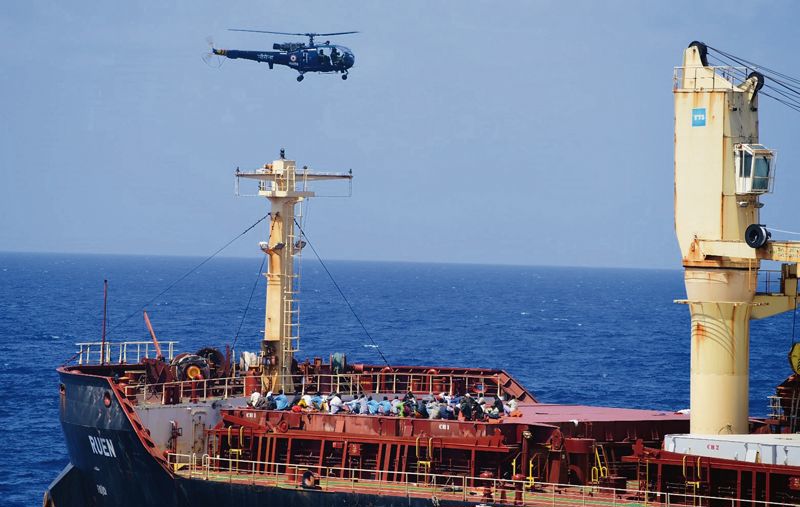
GUARD UP: The Indian Navy has emerged as the main operator against pirates in the Gulf of Aden. PTI
Gurjit Singh
Former Ambassador
IN several recent cases, robust action by the Indian Navy to rescue civilian ships and multinational crews from pirates has been lauded. The Navy has stepped up as the main operator against Somalian pirates in the Gulf of Aden, even as the world’s attention has been on attacks on shipping in the Red Sea.
The resurgence of Somalian piracy is worrisome. It is more anarchic than the Houthi-led attacks in the Red Sea, which has greater political goals. Somalia had almost two decades of piracy, which was finally curtailed around 2016, following which the diplomatic attention surrounding it dissipated. Somalian piracy was on the UN Security Council agenda till December 2021, when the anti-piracy authorisation was allowed to lapse; it has not been renewed. The Combined Joint Task Force based in Djibouti is not dealing with it. It is sporadic action by the US, EU and Indian navies that is keeping the menace in check.
There have been suggestions that the Somalian pirates backed by the Al-Shabaab militant group are acting in tandem with the Houthis of Yemen. Evidently, Somalia is again witnessing instability, leading to desperate action by pirates. The AMISOM (African Union Mission to Somalia) has pulled out of the country. Besides, Somalia has been admitted into the East African Community, an intergovernmental organisation, indicating tentative acceptance of its governance and ability to manage itself.
At the same time, the changing dynamics in the Horn of Africa remain a cause for concern. The best governed part of Somalia is Somaliland, which is autonomous. Ethiopia, while reorienting its policy away from Mogadishu, is linking up with Somaliland with the promise to invest in a new port and, consequently, reduce its own dependence on Djibouti. In return, Somaliland expects diplomatic recognition from Ethiopia. This has raised the hackles of Somalia, which considers Somaliland its territory. Somaliland has also offered the landlocked Ethiopia access to the sea for establishing a naval base.
The UAE, Saudi Arabia and Qatar are all involved with different factions in the Somalian conflict. Turkey has stepped in to counter Ethiopia and signed agreements with Djibouti and Somalia. Somaliland is the only part of the region that maintains a relationship with Taiwan, though Ethiopia is among China’s best friends in Africa.
Puntland is another relatively autonomous part of Somalia where piracy has a base. With reduced internal security, it is at a loose end as well.
In these circumstances and amid the growing threat to international waters, navies are taking a closer look at Houthi-led action against shipping in the Red Sea. Whatever limited support was available to civilian shipping in the Gulf of Aden has further diminished. This creates avenues for elements in Somalia to raise their heads again. This includes the piracy legacy and the arms coming in from the now-subdued Al-Shabaab, whose remnants may be acting on their own.
A Somalia-based analyst, Rashid Abdi, told me that regional forces, particularly the maritime police force of Somalia, have been sidetracked by the political power struggle within the regime in Mogadishu over the last two years. Factionalism has distracted them, and this has allowed pirate groups to regroup and start operations again. Abdi further said: “I am impressed to see the Indian Navy interdict pirate gangs and take robust action to enforce the freedom of navigation in these waterways.”
With increasing instability in governance in Somalia, a lower level of policing, diminished naval operations in the Gulf of Aden and a distraction caused by the events in West Asia and the Red Sea have opened up a space for the resurgence of piracy off the waters of Somalia. This poses a wider problem. When the Red Sea is threatened, obstructing shipping around the Suez Canal, more shipping is made to go around the Cape of Good Hope in Africa and head to Europe. The much longer route, however, has lower insurance costs and leads to more ships now moving in that direction. Ships diverting from there, hence, become the target for Somali pirates in the Gulf of Aden. The recent protection to a large ship that the pirates were using as a mother ship for their skiffs indicates that they intend to make greater inroads in the western and southern Indian Ocean. In the past, they had ventured as far as the Seychelles and the Maldives, using such mother ships.
The Djibouti Code of Conduct and its Jeddah Amendment (to which India is an adherent as an observer) provide regional navies with the locus for action against piracy. It has been instrumental in repressing piracy and armed robbery against ships in the western Indian Ocean and the Gulf of Aden, and its scope has significantly broadened to cover other illicit maritime activities, including human trafficking and illegal, unreported and unregulated fishing.
The role of the Indian Navy now is even more important as a power in the Indian Ocean Region. The US recently sanctioned a $4-billion drone and maritime surveillance equipment package for India, recognising its intent to keep the seas free for commerce. This includes 31 Sky Guardian drones and 170 Hellfire missiles. Incidence of piracy this year is already higher than what it was over the last six years. It was reported in 2013 that piracy cost the world $18 billion annually. Effective handling of the situation is a must to prevent further damage to a globalised economy.
Join Whatsapp Channel of The Tribune for latest updates.




























